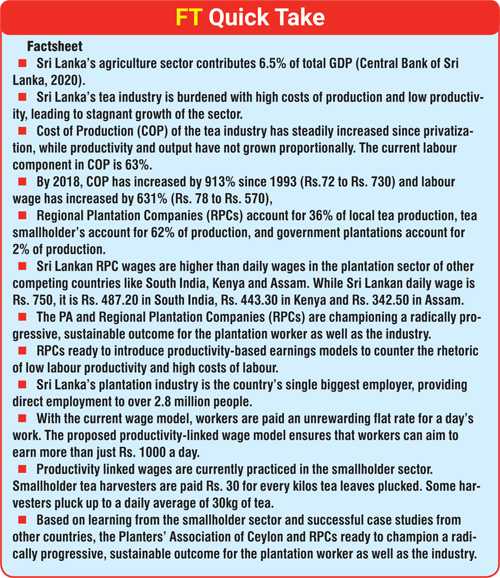Wednesday Feb 25, 2026
Wednesday Feb 25, 2026
Wednesday, 18 November 2020 00:00 - - {{hitsCtrl.values.hits}}

Planters’ Association of Ceylon Chairman Bhathiya Bulumulla
 The Planters’ Association of Ceylon (PA) yesterday announced it would be championing radically progressive wage reforms towards securing a sustainable outcome for both plantation workers, and the industry as a whole.
The Planters’ Association of Ceylon (PA) yesterday announced it would be championing radically progressive wage reforms towards securing a sustainable outcome for both plantation workers, and the industry as a whole.
Emphasising the need to urgently transition away from the existing, colonial-era daily wage system – which had become mired in political controversies and totally disconnected from economic reality – the PA has proposed a new entrepreneurial-based income generating model, in which employees would be in control of their earnings.
For the past 28 years, the Regional Plantation Companies (RPCs) – which produce approximately 30% of all tea in Sri Lanka – and trade unions have been deadlocked in a Collective Agreement to determine daily wages of the plantation employees.
However, with a fresh round of negotiations falling due in January 2021, recently-appointed PA Chairman Bhathiya Bulumulla argued that the time has now come for meaningful and progressive reforms that follow in the footsteps of agribusiness models applied with great success in other nations so that employees are empowered to take charge of their work and are in full control of their earnings.
Speaking at a virtual press conference conducted over video conferencing, he asserted that: “This is the only way forward and we urge all stakeholders interested in the future of plantation families to support the move which will see the employees earn far beyond Rs. 1,000 to as much as Rs. 55,000 to 70,000 per month.
“Everything in the plantation industry – markets, buyers, customers and technology have changed, the only factor that remains the same is the wage mode itself. The time has come to replace this archaic model with a system where workers can become entrepreneurs, and take control of their earnings themselves. Otherwise, they will forever be locked in a wage system that doesn’t benefit them or the industry.
“Instead of the all too familiar rigmarole of forcing an ad-hoc wage increase, we call Trade Unions and the Government to join us in supporting the implementation of a sustainable, productivity-based earnings model. While there are some details yet to be finalised, our industry is unanimous in its support of this reform. This will be the first step towards modernising the entire industry to be globally competitive, while ensuring fair and sustainable livelihoods for our employees,” urged PA Chairman Bhathiya Bulumulla.
According to the PA, such productivity-linked wage models are being practiced in successful agri-businesses across the globe, and have already been proved to be highly effective in Sri Lanka.
“Published research has already proved that on estates where wages are linked to productivity, workers have the potential to earn more than Rs. 65,000 a month. Moreover, on estates where productivity linked wages were trialled and discontinued, worker productivity and worker earnings and productivity fell sharply with the return to a daily wage system. Even among our employees, there is now an understanding that this reform will benefit them the most. The value of what’s being offered is so much more than a daily wage of Rs. 1,000,” stated Bulumulla.
Following privatisation in 1992, the Cost of Production (COP) of the tea industry has increased steadily, although productivity and output have not increased proportionally. “The current labour component within COP is 63%. When wages are linked to productivity, the total COP has shown to reduce, while worker earnings increase. This is simply how economies of scale work,” added PA Media Spokesperson Dr. Roshan Rajadurai (former PA Chairman).
“We pay our workers more than any other tea producer in the world, and yet we record some of the lowest levels of labour productivity. We also want to be clear that we do not want to pay our workers less, we simply want a system of payment which gives them a meaningful encouragement to earn much more. This reform can also pave the way for providing workers with much greater flexibility in their working hours, meaning that once they hit their quota, they can utilise the rest of their time for their own purposes,”
He further noted that there are successful case studies from local estates that have implemented productivity-linked earning models in the past.
“The wage system we are proposing, while it seems new to RPCs, is simply an expansion of what has long been practiced in the smallholder sector and what has been trialled even on RPC and State sector estates, all with great success. We want to take this model, and enhance it even further, so that we offer more than what smallholders pay, and open a path to further reforms from the ground up,” Dr. Rajadurai added. In Sri Lanka, the smallholder sector contributes to 75% of the total tea produced in the country. The Sri Lanka Federation of Smallholders Chairman K.L. Gunaratne explained from his own personal experiences how productivity-linked wages have been far more incentivizing for both workers and smallholder estate owners than a daily wage model.
“Workers are more empowered when their earnings are within their own control. When they start aiming for a personal target, they are able to control the hours the work, and allocate their efforts accordingly. Speaking both from my own experience and on behalf of other smallholders, moving towards productivity-linked wages was definitely the right call for our sector as it increased worker efficiency, livelihood and output in the sector,” Gunaratne affirmed.
Based on lessons learned in the smallholder sector, the productivity-linked model that PA has repeatedly advocated for will enable workers to become ‘agents of change’ within their own communities. In order to ensure a smooth transition to such a model, the PA reemphasised its willingness to collaborate with all industry stakeholders to reform the existing wage model to ensure progress towards a sustainable future for every plantation worker.

Planters’ Association of Ceylon Media Spokesperson Dr. Roshan Rajadurai

The Sri Lanka Federation of Smallholders Chairman K.L. Gunaratne